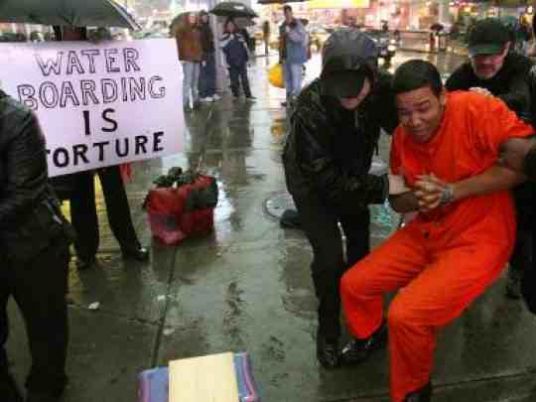
A damning report into the United States' brutal treatment of War on Terror detainees triggered world-wide condemnation Wednesday and calls for CIA agents and senior officials to face justice.
That US interrogators tortured Al-Qaeda suspects in secret jails was known, but a detailed Senate report into the scandal was seized upon by America's shocked friends and gloating enemies alike.
China and Iran, whose own human rights records have often been criticized by Washington, denounced the abuses — but so did Germany and the new pro-US leader of Afghanistan.
"Such a gross violation of our liberal, democratic values must not happen again," German Foreign Minister Frank-Walter Steinmeier said, reflecting the embarrassment of Washington's European allies.
European Commission spokeswoman Catherine Ray welcomed the transparency of the report but warned it "raises important questions about the violation of human rights by the US authorities."
America's great power rival China was equally strict.
"China has consistently opposed torture," Chinese foreign ministry spokesman Hong Lei said.
"We believe the US side should reflect upon itself, correct its ways and earnestly respect and abide by the rules of international conventions."
'Tyranny against humanity'
Sensing an opportunity to poke its traditional foe, Iran seized upon the report to throw back some of the human rights criticism that its own notorious prisons regularly receive.
Iran's supreme leader Ayatollah Ali Khamenei took to Twitter to declare the United States a "symbol of tyranny against humanity" not just in the CIA torture program but in domestic law enforcement.
In next door war-torn Afghanistan, the new leader, who America hopes will work with it to ensure a smooth end to the US combat mission there, distanced himself from his ally's excesses.
"The Afghan government condemns these inhumane actions in the strongest terms," President Ashraf Ghani told a specially-convened news conference at his presidential palace in Kabul.
"There can be no justification for these kinds of actions and inhumane torture in today's world."
Poland, which hosted one of the secret CIA detention centers where detainees were shackled, threatened and abused in a variety of bloodcurdling ways, was also shamed by the report.
Former leader Aleksander Kwasniewski said that as president he had put pressure on his then US counterpart George W. Bush to end brutality at the so-called "dark site" in 2003.
"I told Bush that this cooperation must end and it did end," Kwasniewski told local media.
Those who broke international laws prohibiting torture must be prosecuted, he added.
The United Nations said the program violated international law and basic human rights and British-based advocacy group CAGE demanded criminal proceedings.
Around the world, human rights bodies have demanded that current US President Barack Obama — who halted the torture but has not gone after the perpetrators — take legal action.
'Russian Roulette'
That is unlikely. In Washington, a senior Justice Department official told reporters that nothing in the Senate Intelligence Committee report would change a decision not to prosecute.
The report, released by Democratic committee chair Dianne Feinstein over the objections of some of her Republican colleagues, said CIA torture had been more brutal than previously acknowledged.
It was also badly supervised and ineffective, it found, and CIA officials deliberately misled Congress and the White House about the value of the intelligence its interrogators were gathering.
Among the findings: a CIA operative used "Russian Roulette" to intimidate a prisoner and another — untrained in interrogation techniques — threatened to use a power drill.
Detainees were beaten, waterboarded — some of them dozens of times — and humiliated through the painful use of medically unnecessary "rectal feeding" and "rectal rehydration."
In response to the report, Obama acknowledged that torture had been counterproductive and contrary to American values.
"The report documents a troubling program involving enhanced interrogation techniques on terrorism suspects in secret facilities outside the United States," Obama said.
"It reinforces my long-held view that these harsh methods were not only inconsistent with our values as nation, they did not serve our broader counterterrorism efforts or our national security interests."
But CIA director John Brennan defended his agency's adoption of tough tactics in the aftermath of the September 11, 2001 Al-Qaeda attacks on US cities by Al-Qaeda operatives.
He insisted that, while mistakes were made, the brutal techniques used on captured suspects "did produce intelligence that helped thwart attack plans, capture terrorists and save lives."

